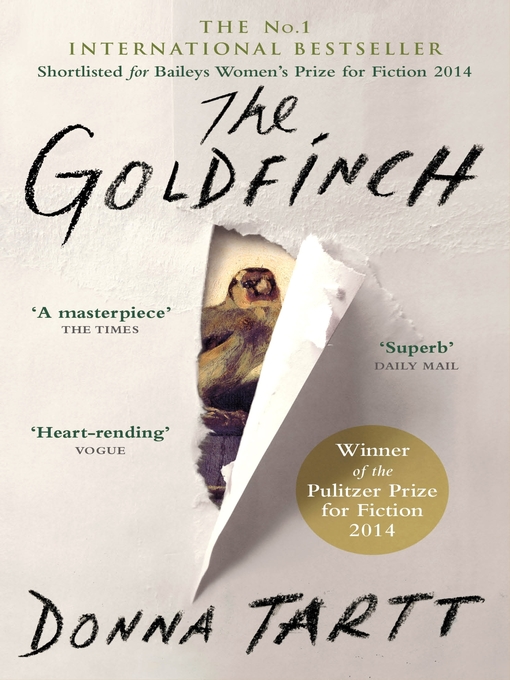 It's too hard to even talk about this book. It's beyond description, really. But I shall try.
It's too hard to even talk about this book. It's beyond description, really. But I shall try.The novel starts with a feverish young man shivering alone in an Amsterdam hotel room. Afraid to go out, he scans indecipherable Dutch newspaper articles for his name amongst pictures of police cars, incident tape and dead bodies. We go back 14 years to the beginning.
12 year old scholarship student Theodore Decker is in trouble at school for silly, petty reasons. On the morning he is due to attend a meeting with his headmaster, Theodore and his mother Audrey take shelter from the rain in one of New York's lesser known museums, but one that Audrey visits regularly. Theo isn’t much of an art lover, sulking about his impending meeting and squinting at dreary Dutch paintings of autopsies and dissections. He feels a strange, inexplicable connection to a red headed girl, attending the exhibition with her elderly grandfather- they remind him of his mother; gentle, absorbed in the art.
Doubling back for one last look at the mystery girl when the explosion occurs, Theo becomes an unlikely survivor of a huge terrorist attack. Comforting the girl's dying grandfather in his last moments of life, the man gives the dazed and shock ravaged Theo a family heirloom and an address in the West Village. Theo, operating purely on adrenaline and instinct staggers out of the museum with a tiny painting of a Goldfinch and the dead man's ring. And without his mother.
Displaced and homeless with no family in New York and a herd of councillors, therapists and social workers on his case, Theo desperately tries to avoid falling into 'the system'. When his alcoholic, gambling-addict father turns up to whisk Theo to a fresh start in Las Vegas, his life becomes a cloud of disillusion, drugs, booze and underachievement with fellow waster Boris, the alcoholic schoolboy on a self-destructive path to crime. The bulk of the middle section of the story follows Theo's emotional ups and downs of living in Vegas, the lack of company, the endless hours of TV and dog walking in the desert, and the effects of gambling in a town of addicts. He sees how similar he is to the father he despises and he's afraid for his future. He never really stood a chance. Over the years, Theo's lies, omissions and bad decisions draw him deeper and deeper into the shady underworld of Art criminals, traffickers and drug gangs as he leads a double life of antiquarian respectability and narcotic-deadened depression and fraud.
The cast of characters in this book is immense. Each is beautifully realised, full of their own little nuances, motivations and flaws as they weave in and out of Theo's life, colliding and clashing and building a complicated web of accomplices, allies and antagonists. Hobie, the antique dealer is easily the most stable aspect of Theo's post-explosion life, constant and dependable and the origin of most of Theo's happiness. He repairs the old and the damaged and feels fresh out of a Dickens novel. Poppy, the granddaughter of Hobie's late business partner is the unobtainable dream girl from the museum- the girl that constantly reminds Theo what he could have had if he'd had a normal life and hadn't been so hopelessly ravelled up in theft and fraud and drugs.
The Goldfinch is essentially a complicated coming of age story about dealing with loss, betrayal and about the weird adventure that friendship can be. Central also is the importance of cultural history and the preservation of beautiful, important things, and the concepts of home and belonging. It's about life's often sickening pace, but also about its excruciating stagnation. The book is a sequence of causes and their effects as Theo lurches from one disaster to another, uprooted at such an early age and drifting ever since. I loved the character of Theo, apathy, passion and all the rest of his bipolar baggage and desperately wanted him to be ok. I loved how much he cared about the painting that he unintentionally stole, the effect that it has on him and the secret sense of self-worth that he believes it gives him. There's something vulnerable about him, even as an adult, and his seld destructive personality makes him pretty funny at times, and thoroughly tragic in others.
Tartt's prose is amazing, she draws the reader into a world that's real and tragic, populated with characters that are self-destructive and nihilistic and others that are almost angelic in their innocence, all drawn together by chance and circumstances. The acrid dry heat and huge dark skies of Las Vegas and the cramped and impersonal chaos of garbage strewn New York. It's a book of opposites and contradictions. For everything beautiful, there's something destructive and ugly. There are huge sections of prose that seem so meaningful and applicable to all of life. The language in this book, especially sections that relate to the art, the effect of art on the heart and the importance of preservation are incredible.
I hope this waffly adoration makes sense. It's simply an incredible, intricate, important piece of writing It's beautiful and horrific and heart-breaking. Fast paced but measured and delicate, and full of brilliant characters and ideas and important little moments. An instant modern classic. I loved it so much I was procrastinating towards the final section, so it didn't have to end. The Goldfinch makes me want to go out into the world and scrutinise some art and see which picture it is that speaks to me personally, like the Goldfinch does to Theo.

No comments:
Post a Comment